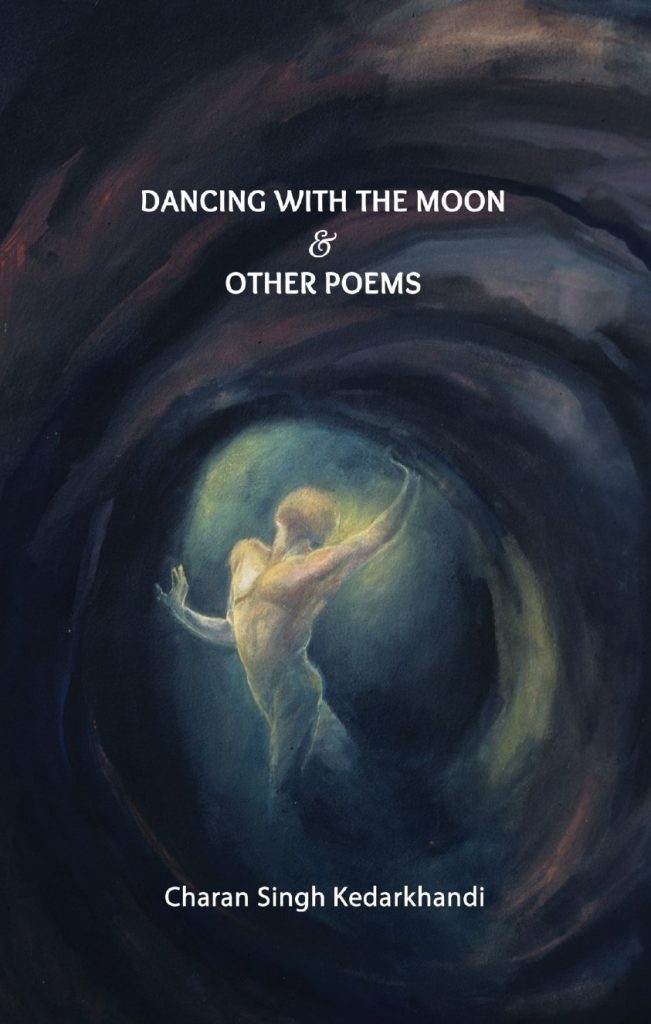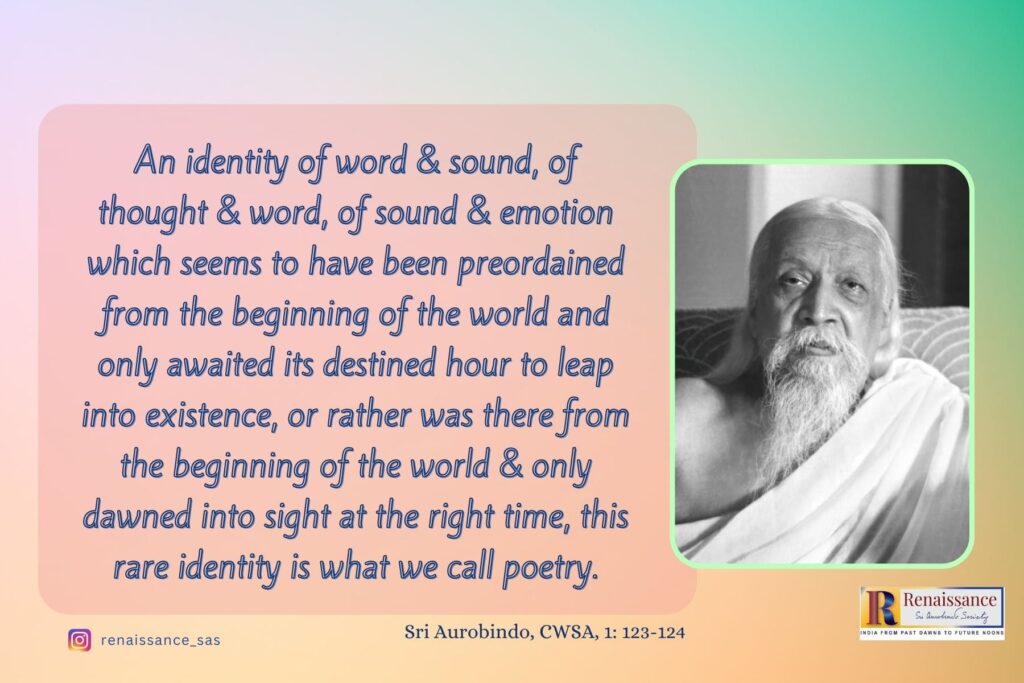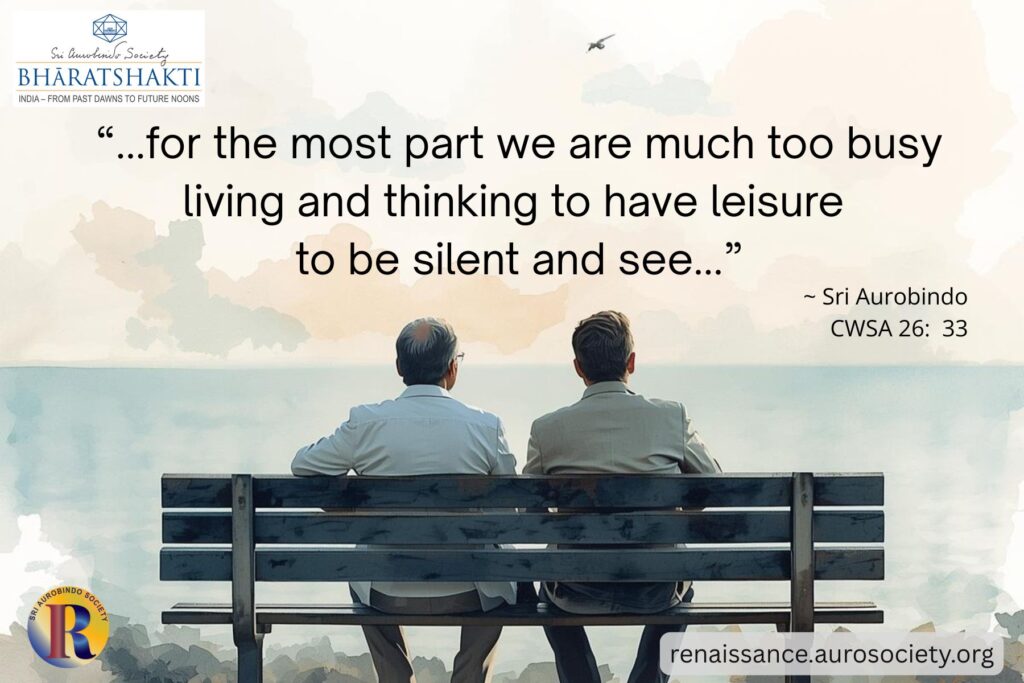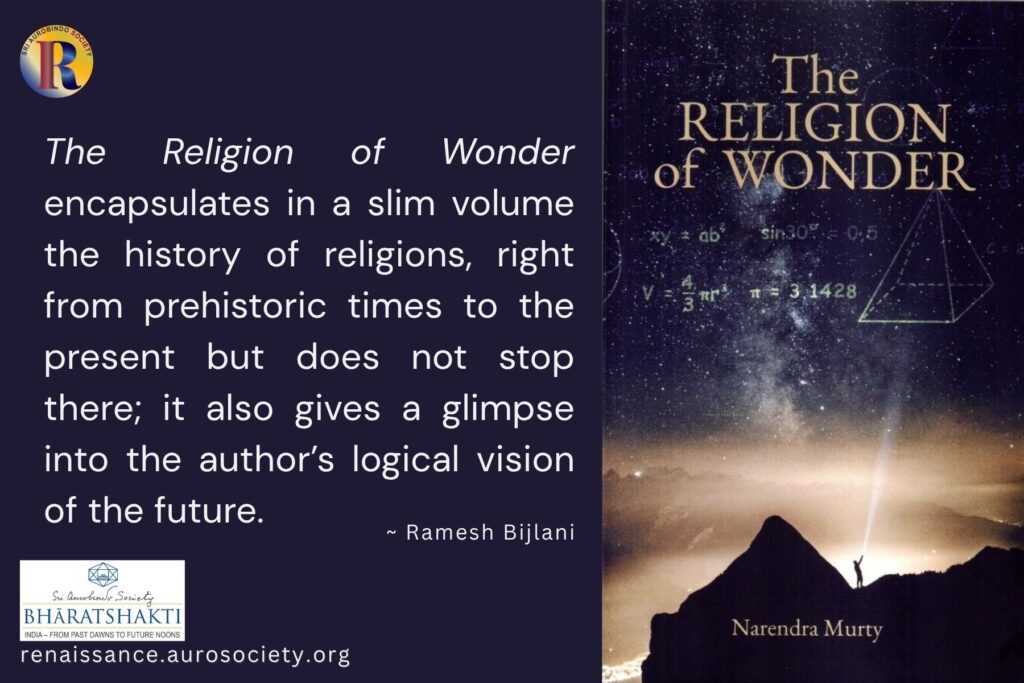For our ‘Book of the Month’ we are happy to feature Dr. Charan Singh Kedarkhandi’s recently released book of poetry (2023, Sri Aurobindo Study Center, Joshimath, ISBN: 978-81-7060-443-3). The book titled ‘Dancing with the Moon & Other Poems‘ is a collection of 80 poems, each with its own special charm and beauty, each expressing a different emotion. This is Dr. Kedarkhandi’s first book of English poetry, though he has penned several poetry collections in Hindi before this.

A high and wide range of observations and introspections regarding all that goes on in life around and within, and inquiries and insights into the human condition — both inner and outer, find creative utterance in the poems of Charan Singh. He acknowledges regarding his source of inspiration in the Acknowledgements section of the book:
What a fascinating journey life has been for me, full of twits and turns, tornadoes and trepidations! Out of this adventure has emerged the present book. It is full of roar and rancour, chasm and chaos, anger and hunger, disorder and dichotomy. Because that is how the world is. The world of the Word cannot be different from the real world.
I am a poet. I need to be serious and sincere to my times and climes. I can’t injure my age, sabotage my people, flatter my world. (p. 124)
Take a look at his poem titled Don’t Mind, if You Have Mind. I do not think a more accurate picture of our times could have been painted.
The irony of our smart time:
despite our growing galaxy of superminds
the number of idiots is mushrooming everywhere!
and the Elegy is that:
nobody seems bothered about this
despite mind and matter
politics continues to be
the headquarters of stupidity
academia is not far behind!
Fallstaffs of the world have colluded against Knowledge
and free thinking
in the garb of critical ideas
they are throwing away
every precious matter
but,
who minds? (p. 96)

Read more by Charan Singh Kedarkhandi:
Pondicherry Yatra, an Inner Journey
The book Dancing with the Moon & Other Poems opens with an introductory essay which gives the reader a good glimpse into the poet’s understanding of the place and role of poetry in Life and Literature. Speaking of poetry as the “deepest and most sublime music of existence” he reminds the reader that poetry not only moves and touches the reader, it also has a transformative role and helps both the poet and the listener transcend all aspects of life. He continues:
Poetry savours life’s glories, heals her deepest miseries, soothes the ailing and suffering humanity, encourages the sanguine visage of existence, uplifts the spirits from dark and dolorous moods of time, gambols with babies in their millions of smiles, toils hard with the farmer, supports the travails of labourer and craftsman in the terra firma of life and rejoince sin the jolly gestures of women who nurture the buoyant garden of life. (p. 5)
Here in one sentence we get a peek into the various themes that form the subject matter of the poems in this collection.
The poet makes you see and feel the conflict, chaos and confusion in life and world today. But then soon, he also helps in rediscovering that inner quietness and calm courage which helps one transcend the limits of mind and life and aspire for a greater light and delight, a new world of hope, beauty and perfection.
The poems arouse sometimes a delightful feeling of joy and elevation, at other times bring a knowing sigh that simultaneously recognises the pang in the poet’s heart which lingers somewhere inside the reader too. At times reading from one poem to the next feels akin to walking into an unfamiliar space with a sense of awe, wonder and nameless sensations. But one is always left with a perception of beauty and a sublimity of feelings.
Sri Aurobindo notes that no matter how great the subject matter of the poetry is, that alone doesn’t qualify it to be called poetry. He writes:
Matter by itself does not make poetry; skill in verse & diction is not poetry; striking & brilliant phrases, melodious weavings of sound are not poetry; it is the natural & predestined blending or rather inseparable existence of great matter with great verse producing high emotions or beautiful matter with beautiful verse producing soft emotions that gives us genuine poetry.
~ CWSA, Vol. 1, p. 123
In many of the poems included in this collection, we find that “inseparable existence of great matter with greater verse” capable of producing high emotions. Take for example, the poem titled Detritus (p. 37)
Let tomorrow never forgive us
for
sowing ubiquitous barrenness everywhere.
Someday, not far from now,
our glimmering cities
besotted with food, fun and frolicking
gloating over glass skyscrapers
shall fumble and crumble in the courtyards of Time…
and man will be
consumed by the leftover shards of his hubris.
He placed garbage bins
everywhere
and never dumped the actual filth
Man is languishing in manholes.
What will it take for the man to climb out of the manholes in which he continues to languish despite all the swachhta missions going around?
Speaking of the poet as being “deeply involved in mankind”, Charan Singh reminds in his introductory essay that a poet cannot avoid the key questions facing humanity. Life, death, disease, disasters, existential threats and traumas and tragedies of life are unavoidable and essential themes of his strains. But a true poet while being so involved in mankind also must “reveal before man new dawns and destinations with inputs and insights to face the most ferocious of tsunamis.” (p. 11)
Take for example, Charan Singh’s poem titled The Dance of Shiva in which we see how to prepare and work toward the slowly but sure advancing new dawn.
the universe sways
by his rhythmic dance
Tandav, the death dance of life!
every element feels his sway,
feints in his Furies,
he seduces, slimbers,
Shiva topples down flimsy, fake and feigned edifices,
foils nefarious designs, mocks perverted joys
his dance must be celebrated
in full
as an unbroken reality, a totality, a trance.
you have to feel the dancer and the dance
as one single reality
without discarding the witness of the show
in the show
Shiva saves by killing. (p. 110)

Check out POETRY section on Renaissance
Then there are poems in this collection which represent what Sri Aurobindo speaks of as blending “beautiful matter with beautiful verse producing soft emotions.” For instance, we have a beautifully moving ode to John Keats about whom Sri Aurobindo has said that he worshipped only one godhead — “the image of divine Beauty, and through this alone he wished to see Truth and by her to achieve spiritual delight and not so much freedom as completeness.” (CWSA, Vol. 26, p. 125) In the poem titled Keats, the Forlorn Child, Charan Singh paints this image:
like bubbles in oceans of Eternity
his name surges
high towards the sky
enthusing, inspiring, alluring
generations of men and women
poets and paupers
hinting, minting the adventures, audacities
of “unheard melodies” and
innumerable untrodden paths
a life so short and yet so perfect!
thank God, he was forlorn!
and
never married with chaos and cacophony of civility. (p. 79)
But a poet’s work goes beyond producing soft and beautiful emotions.
He is also not merely a herald, an exegete and a doctor to human soul. A poet is a “mystery revealer, a thaumaturge for the theatre of life,” writes Charan Singh in the introductory essay. He continues:
He deftly acts as bridge between the seen and the unseen, the known and the unknown, the perceptible and the imperceptible, the ordinary and the arcane. Through his immense imaginative and experiential powers he is able to tread the abstruse alcoves where ordinary minds dare not traverse. . . As a philosopher, the poet shuns effete emotionalism of all kinds and laughs on world’s events with an unparalleled majesty of Sri Aurobindo. . . (p. 13)
A good example of this role of the poet can be seen in these lines from Lessons Not to be Forgotten Ever:
an invisible virus,
visible everywhere!
exposing human hubris and helplessness
exclaiming aloud:
man is not the centre of the earth
what a great satisfaction,
indeed! (p. 57)
Another example from Silence: The Poetry of God (p. 71)
we will never hear the sound of silence
the call of clarity
unless
we lose interest in shallow words,
turbid, turgid talk, tall noisy promises
lacerating lectures mauling the face of meaning
and
the weeds of meaningless noise
Many of the poems in this collection will definitely help you in hearing the sound of silence. Read them, with your heart, so you can hear!

About the poet: (From the back cover of the book)
Dr. Charan Singh Kedarkhandi is a poet, thinker, flâneur, spiritual seeker and a student of the Indian knowledge tradition. He lives and works in Jyorimath, Himalayas of Devbhoomi, Uttarakhand. He earned his PhD on Sri Aurobindo’s poem Savitri from H.N.B. Garhwal Central University.
Widely respected as an authority on Sri Aurobindo’s poetry, yoga and philosophy, Dr. Kedarkhandi writes and speaks about the spiritual vision of the Mother and Sri Aurobindo in various books, journals, magazines, seminars and conferences. He is the founder member of Sri Aurobindo Study Centre, Jyotirmath (Uttarakhand) and also edits the centre’s annual bilingual magazine Anukampa, the Grace Divine. He is currently working as assistant professor of English at Govt. P.G. College, Jyotirmath.

To purchase the book, please contact the poet directly by emailing: <[email protected]>
~ Design: Beloo Mehra



